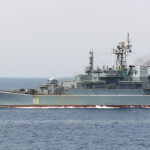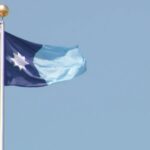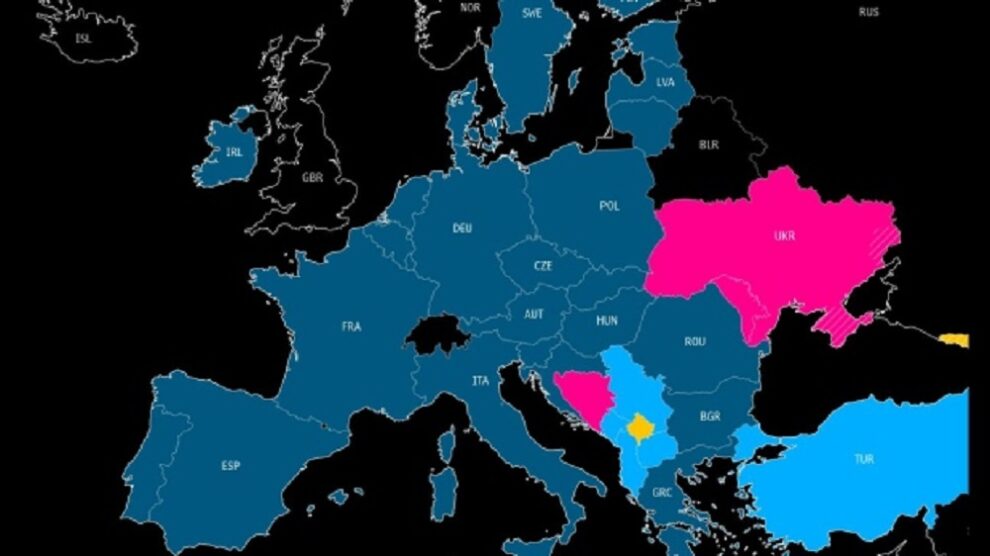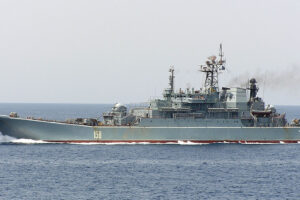(Bloomberg) — Last month, Milorad Dodik, the Russia-backed leader of Bosnia’s Serb population, appeared on local television and announced his plans to become the first president of a Bosnian Serb breakaway state.
The declaration, which stirred memories of the brutal ethnic cleansing that took place in the region nearly three decades ago, came just a month after the European Commission declined to recommend accession talks with Bosnia-Herzegovina. In a country considered Europe’s hottest flashpoint after Ukraine, the Commission’s decision was a gift to political actors such as Russia that are looking to provoke instability.
Bosnia, a land of 3.3 million physically divided between Bosnian Serbs on one side and Muslims and ethnic Croats on the other, applied for EU membership in 2016 and was granted candidate status last year. But its dream of European integration, which has helped hold the Western Balkan country together despite ongoing tensions, appears distant at best.
With the bloc looking to accelerate its long-stagnant enlargement process to prevent neighbors from falling under the influence of nations that don’t share EU values, European Union leaders are convening on Dec. 13-15 to discuss whether to open membership talks with Ukraine and Moldova — a process that could take years. Even with member states’ green light, the path to membership is lengthy and complicated. Croatia was the last country to join, and its application took 10 years before it was formally accepted in 2013.
Even so, these discussions have contributed to the perception that certain countries get preferential treatment when it comes to EU accession, while the Western Balkans are being shunted aside.
This has also played into the hands of Dodik, a 64-year-old politician who has exploited the structures imposed by Bosnia’s 1995 peace agreement to advocate for the secession of Bosnian Serb territory.
The Dayton Peace Accords ended the four-year-long war that killed more than 100,000 people, but it also froze in place the country’s demographic divisions. Serbs, who like Russians are majority Orthodox Christians, were given a swath of land along the western and eastern borders, known as the Republika Srpska, and a federation of Muslims and Croats received a roughly equal amount of territory in the southwest. The two parts are loosely united by a weak central government and a rotating three-person presidency whose members must be drawn from each group.
As all constitutional changes require consensus, this set-up enables any of the ethnic leaders to hold Bosnia’s EU accession process hostage. Dodik has refused to implement the reforms needed to move things forward unless his own demands are met, according to Christian Schmidt, the top international official in Bosnia. Among them is the partial dissolution of the country’s constitutional court. In recent months, the Bosnian Serb leader has also criticized the EU and expressed an interest in developing closer relations with Brazil, Russia, India, China and South Africa.
The structure that gave rise to this situation, said Florian Bieber, director of Centre for Southeast European Studies at the University of Graz, is one reason why he considers Bosnia “the most fragile, most hopeless country in the Western Balkans.” “Nobody would today include a constitution in a peace agreement or create such a rigid ethnic straitjacket for a country,” said Bieber. “It created peace, but empowered people like Dodik.”
Bosnia’s slide towards isolation is unfolding against a backdrop of EU frustration across the Western Balkans and efforts by Russia, overt and covert, to increase its regional influence. Four other countries – Serbia, Montenegro, North Macedonia and Albania – are in various stages of the EU accession process, and Kosovo is seeking candidate status. Yet delays and European ambivalence — according to a poll conducted in six EU countries including France and Germany by the European Council on Foreign Relations, only 28% of respondents thought Bosnia-Herzegovina should be able to join the bloc — have soured many people on moving forward. As things drag out, Putin has been actively supporting regional political parties and leaders perceived to be friendly toward Russia.
Dodik’s cozy relationship with Putin, who he often visits in Moscow, has paid dividends for both men. In Banja Luka, the capital of the Serb territory, Russia is helping fund the construction of a Russian-Serb temple and cultural center; while in May, Dodik remarked that “Putin knows he has to thank Republika Srpska for Bosnia’s failure to implement sanctions against Russia.” Moreover, even though EU nations are the biggest investors in Bosnia and Serbia, a November poll by a Republika Srpska’s Ministry for European Integration found that support for joining the bloc had fallen to 38%.
As excitement fades around the EU, other state actors are also ramping up their influence campaigns. In parts of Bosnia where Muslims make up about 70% of population, Saudi Arabia and Turkey are making their mark. The Saudis built a large King Fahd cultural center and mosque, and the number of “dry” restaurants and hotels, virtually nonexistent before the war, have steadily increased.
EU leaders, meanwhile, are responding with concern. Latvian President Edgars Rinkevics said in a Bloomberg interview that the failure to bring the Western Balkans closer to the bloc has increased Russia’s influence in the region and is making the EU more vulnerable. In November, Austrian Foreign Minister Alexander Schallenberg said that Bosnia should be treated on par with Ukraine, which has been moving along in the accession process.
Other neighboring countries may soon present similar challenges. In late October, European Commission President Ursula von der Leyen visited Montenegro and praised it as the Western Balkan nation furthest along on the path to EU accession. But just several hours earlier, lawmakers in the capital of Podgorica approved a government whose pro-European Prime Minister Milojko Spajic formed a coalition with Euroskeptic parties that favor stronger ties with Serbia and Russia.
Serbia, Russia’s stalwart ally and the biggest country in the region, has also been in talks with the bloc since 2014, with little progress. Longtime leader Aleksandar Vucic, an ally of Dodik’s, has continued to court the EU as an investor even as he maintains close ties to Russia and refuses to implement sanctions. Support among Serbian citizens for EU membership is now below 50%, according to a January government poll.
In a recent panel discussion in Belgrade, Serbia’s Deputy Prime Minister Ivica Dacic highlighted what he called “empty” EU promises, without noting that Serbia hadn’t moved on the EU’s key request – normalizing ties with Kosovo. “Over the past 20 years we’ve heard numerous messages about the importance of Western Balkans on the EU’s political agenda,” he said. “Promises made long ago have long faded. The European Union is present in our region but we think that it’s high time for it to revitalize its enlargement policy and validate our reform efforts.”
To change direction in Bosnia and stabilize the region, according to an EU diplomat with knowledge of the situation, the country must be “irreversibly” put on the EU path as soon as possible.
Difficult decisions on all sides would be needed to break the impasse created by the Dayton Agreement. That could come down to a choice, as Bieber, the Balkans expert put it: “One has to decide what is worse – giving up on the conditions and making the EU look weak, or insisting on conditions and making Bosnia more unstable, more fragile.”
As Brussels deliberates, the gap within Bosnia is already widening.
In Jajce, a small town in the western part of the Muslim-Croat federation that was once the site of fierce battles between Bosnian Serb troops and Muslim and Croat forces, city council president Josip Topic worries that the end of the European dream could also mark the end of his country’s fragile peace. “Bosnia cannot function without all of its three nations, and that includes Republika Srpska,” he said.
Just over an hour’s drive away in Banja Luka, however, that view is losing its hold. “If it wasn’t good enough for the UK, why should it be good enough for us?” Zeljko Piljak, a 24-year-old economics student in Banja Luka said of EU membership. “European values are not our values. We feel closer to Russia.”
Source : BNN Bloomberg
















